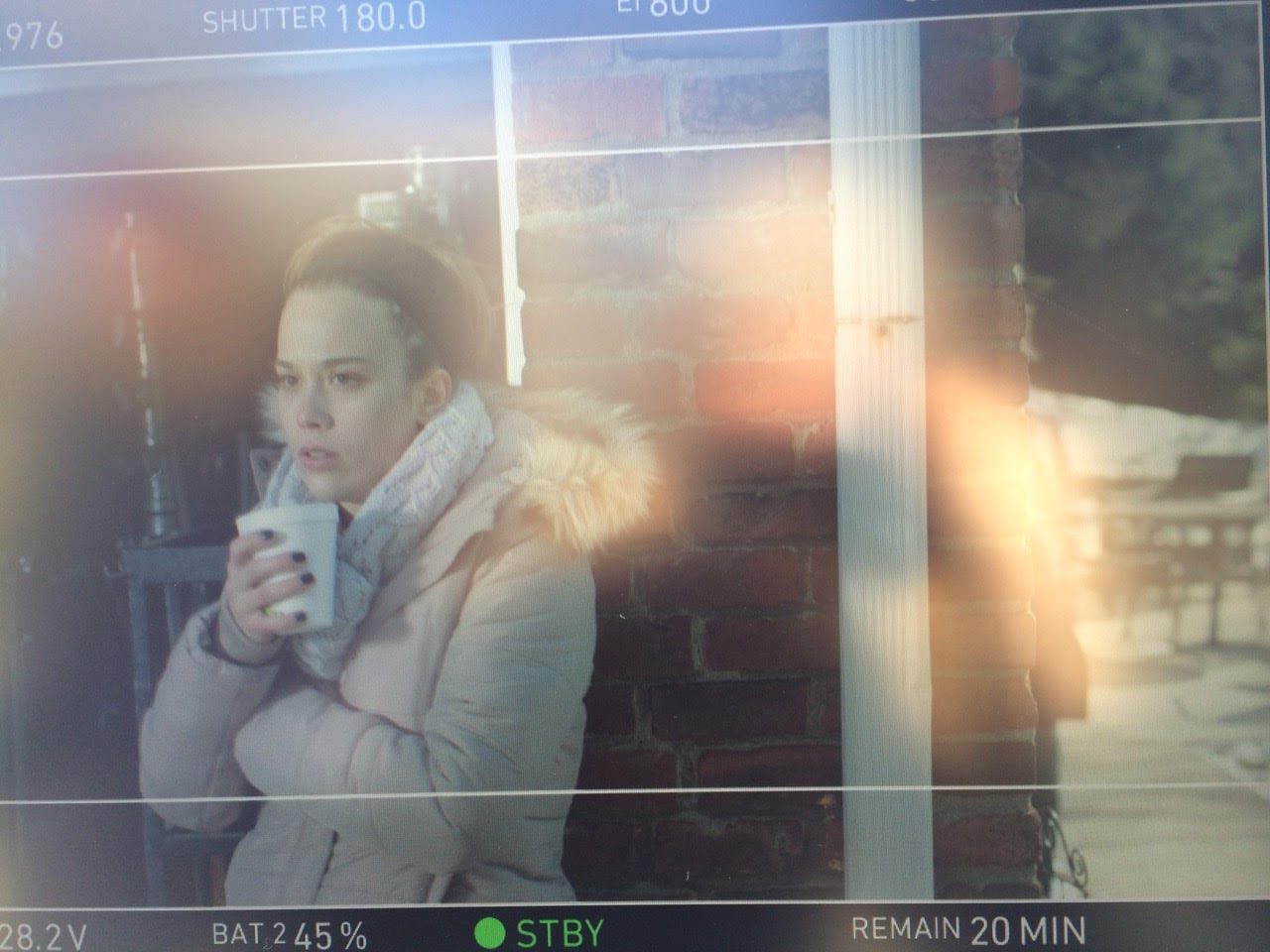Like "Clerks," but sweet and anti-capitalist: This obscure coming-of-age comedy speaks to everyone
I especially appreciate it because it captures the flavor of life in my native state, Pennsylvania
During a key scene in “Hollidaysburg,” depressed Penn State undergrad Heather (Claire Chapelli) talks dropping out with her ne’er-do-well mechanic stepdad Mitch (Brian Shoaf). Every other character is encouraging her to stay in — her friend Petroff (Tristan Erwin), as will be discussed later, has unusually compelling arguments —but Mitch wants her to jump off the figurative ledge.
After all, he cavalierly observes, some of the best lessons he ever learned in life were picked up after he joined a cult and wound up in jail.
“That speech is one of my favorite things!” director/writer Lukas explained. “I loved writing it, I loved executing it, I love the actor’s delivery so much.”
“Hollidaysburg” is packed with droll moments like this one. Technically speaking, the 2014 indie film is best known as one of two movies produced on that year’s reality TV show “The Chair.” Little-known director Anna Martemucci, who directed and for all intents and purposes wrote “Hollidaysburg,” competed against Shane Dawson, an OG YouTube star whose reputation has been destroyed by his so-called “jokes” about pedophilia and racism. Dawson denies being these things, of course, but his entry for “The Chair” is “Not Cool.” The only two things that deserve to be said about “Not Cool” are (1) it’s a movie made by a person who if not in fact a racist pedophile as accused does a damn good impression of one (check out these two reviews for more details) and (2) it does not deserve to be in the same conversation as “Hollidaysburg,” except to provide the aforementioned context.
Oh, there is one more detail: The concept behind “The Chair” was that both filmmakers would adapt the same script — a simple romantic comedy about college freshmen returning to a small Pennsylvania town for Thanksgiving weekend — and then “the public” would vote on which movie was better. Because we live in a capitalist society, Dawson’s millions allowed him to effectively overwhelm Martemucci, who now goes by A. M. Lukas. Simply put, he won the contest simply because he has a large pre-existing fan base — with all of the monetary advantages that comes with possessing such a vast resource — and she does not. “The Chair” chronicles all of that, and is worth seeing if you’re a connoisseur of bitter ironies.
Yet “Hollidaysburg” is worth seeing for a very different reason. Unlike the Donald Trump-y comedy in “Not Cool,” which exults in casual cruelty and mocking the marginalized, “Hollidaysburg” channels the existentialism of Lukas’ fellow Pennsylvanian, author John Updike. Each character is in their own way struggling with the reality that, once an American graduates from high school, they are forced to figure out their future in a capitalist society only offering bleak options. Heather is depressed because she sees college as an expensive scam dispensing no meaningful life guidance. Meanwhile her relationship with high school sweetheart Scott (Tobin Mitnick) is doomed by the fact they now live on other sides of the country, the bleak reality of which Scott stubbornly insists on denying. When Heather dumps him mid-coitus in the movie’s opening scene, he wallows in self-pity and seeks a rebound with Tori (Rachel Keller), an Updike-quoting freshman who struggles with her own drama in the form of her needy, often toxic best friend Katie (Kate Boyer). Rounding out the list of major characters are a pair that serve mainly as the stoner inner consciences of the primary protagonists: Petroff, a willful underachiever working at a pizza place against his parents’ wishes and offers Heather valuable life advice, and Scott’s brother Phil (Philip Quinaz), a stoner obsessed with baking the perfect pumpkin pie and convincing his little sibling to literally and figuratively move on.
Lukas skillfully juggles the numerous characters and plot arcs without dropping any of them, yet two stand out for me specifically. The first involves Heather’s scenes platonically bonding with Petroff over their mutual depression and desires to slack off, during which the pair banter and philosophize about capitalism (though they never use the word “capitalism”). The second are the scenes in which Tori learns to assert herself in a world that often steamrolls over her.
The Heather-Petroff subplot is, in an understated way, quite bold. A lesser filmmaker would have had them hook up, but Lukas wisely steers things away from those sorts of clichés. More than any other character in the film, Heather perceives the hopelessness of adult life, seeing both college and employment as sterile paths leading to death and oblivion. Petroff has similar doubts, but seems to find liberation in leaning into them. In one of the film’s funnier line readings, Erwin muses that his Mom wants to evict him so he’ll go to college, but he earns enough that she can’t jack up the rent enough to justify doing so. Later, when Heather asks him about SAT scores and he demurs from answering, she calls him out for the fact that they weren’t too low; they’re embarrassingly high for a pizza clerk/dope dealer.
“Petroff is the person who's smarter than everybody else, because they just are and because they like to read, but they have no time for grades or any of the trappings,” Lukas said, adding that he was based on a real childhood friend of hers from Hollidaysburg. “The real Petroff kind of got off on being from the wrong side of the tracks, a little bit. He may have even leaned into that identity.”
The bottom line is that Petroff protects Heather from her own worst impulses, like becoming reclusive or resorting to excessive drug use. Heather in turn gives Petroff an ego boost he didn’t entirely realize he needed, allowing an otherwise self-absorbed kid to perform an act of basic kindness. The storyline works both as social commentary and as entertaining cinema. An ideal society, after all, would not cast young humans into a grinder like so much raw meat to sharks, which the film’s characters clearly state in various ways. Petroff, Heather and their peers never come across like ideologues or cardboard cutouts espousing Lukas’ philosophical views. Loosely drawing from Dan Schoffer’s script, Lukas paints a canvas filled with characters that feel like real human beings.
“So much of the film is based on my own adolescence in Pennsylvania. I’m a real believer in writing what you know—not necessarily the literal stuff, just anything on which you can claim some kind of emotional authority.” Lukas said. “My first real experiences as a student of fiction were studying Updike’s early short stories. He used his life as fodder and his high school classmates as inspiration. I really grabbed onto the tenet of fiction writing that says the more specific you get, the more universal your work becomes. So when an opportunity rolled around to rewrite a coming-of-age film I thought: hmm depict the insanely banal loss of my own virginity? Let’s do it!”
This brings us to Tori, who in so many ways feels like an analogue for the real-life Lukas. She is an outspoken feminist, criticizing rap lyrics for their misogyny and the pornography industry for its exploitation, and she reads a lot for fun. Her parents are also quite accepting (they sexually experiment and happily welcome their daughter’s lesbian partner, played by Lukas), and Tori no doubt benefits from a privileged upbringing given the surplus of food in her home.
Despite being more economically privileged than characters like Petroff, however, Tori like so many women under the patriarchy struggles to use her voice. Her best friend Katie controls her and disregards her boundaries, her high school years were marred by being awkward and getting casually teased, and when Scott aggressively pursues her romantically, she grasps for a way to let him know he’s coming on too strong.
“Again, I think it's that thing of getting really specific, like when Tori hits Scott with her car, asking myself: ‘what would I actually do in that situation?’” Lukas reflected. “The character says something like “I’ll research this because that’s what a good person would do.’ Questioning whether or not I’m a ‘good person’? That’s been a neurotic through-line in my life, and (I now suspect) in a lot of people’s.”
She added, “Each character is basically an amalgamation of my memory of certain high school classmates.”
It is for this reason that I argue “Hollidaysburg” is best put in a conversation not with “Not Cool” but with a worthier film, Kevin Smith’s 1994 feature debut “Clerks.” Though set twenty years apart and on opposite sides of the Delaware River, “Clerks” is also a dialogue-heavy character drama generously sprinkled with comic elements. In the case of “Clerks,” Smith drew from his New Jersey childhood growing up in a pop culture-obsessed youth group. Whereas “Not Cool” barely pays attention to its Pennsylvania setting, “Hollidaysburg” is chock full of beautiful Pennsylvania scenery, accents, location shots and culture. As anyone who has lived in Pennsylvania will tell you, the state’s palette consists of lush greens, rustic browns and relaxing oranges, all of which suffuse the movie’s background. This is Rust Belt Pennsylvania, to be sure, but not inherently derelict or hopeless. The Hollidaysburg of “Hollidaysburg” mixes small-town charm with ennui in equal measure, and that atmosphere permeates every shot. Cinematographer Meena Singh deserves all the credit in the world for turning the story of “Hollidaysburg” into a rewarding visual experience as well.
“The basis of fiction-writing, as I was taught by the late Penn State professor Peter Schneeman (to whom I dedicated the film)…” Lukas said. “…is to use whatever you have, whatever you are expert in, in terms of life experience, and mine it for specificity, even if it seems ordinary—like working as a store clerk in Jersey for instance! There’s so much beauty in the mundane. And there’s so much laughter in the truth of human experience.”
If as a filmgoer you want this refreshing mix of philosophy, drama and humor, I can’t recommend “Hollidaysburg” strongly enough. While Lukas has not cracked the code for finding meaning in life in a capitalist wasteland (who has?), from her new life in semi-ironic exile in London, she can reflect back happily upon the mosaic of human experiences she crafted in “Hollidaysburg.” It’s an upper of a film in our downer chapter of history precisely because its characters learn how to make peace with life’s complexity, in all of its happiness and pain.
Sure, things get scary out there, but if the worst possible outcome is death, isn’t that reason to be less afraid? I strongly suspect this is why “Hollidaysburg” continues to have fans like YouTube influencers Nick DiRamio and Brie Cheese. To draw from an Updike quote that appears in the movie:
“Each day, we wake slightly altered, and the person we were yesterday is dead. So why, one could say, be afraid of death, when death comes all the time?”
Back Seat Socialism
Column by Matthew Rozsa who is a professional journalist for more than 13 years. Currently he is writing a book for Beacon Press, "Neurosocialism," which argues that autistic people like the author struggle under capitalism, and explains how neurosocialism - the distinct anticapitalist perspective one develops by living as a neurodiverse individual - can be an important organizing principle for the left.
Twitter (X) @MatthewWRozsa





